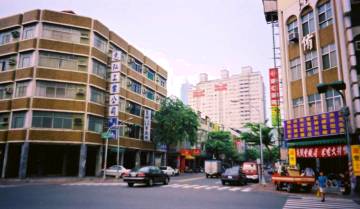|
Week of December 17, 2001 Snapshot from the Field |
 Taiwan Relaxes 50-Year-Old Restrictions on Doing
By JACK LYNEBusiness with China Site Selection Executive Editor of Interactive Publishing
TAIPEI, Taiwan -- If politics make for strange bedfellows, flows of facilities and investment make for pragmatic politics.
New business rules notwithstanding, relations between Taipei (pictured above) and Beijing continue to be strained. Talks between the two nations have been frozen since 1999.
The revamped rules also officially sanction Taiwanese companies' investing and manufacturing in more than 1,400 product categories. Among the MAC-sanctioned product lines are more than 100 high-tech products, including cell phones, DVD players, hardware, notebook PCs and telecom.
New Rules Very Near Election
The subsequent poll tallies marked a major victory for Taiwan President Chen Shui-bian's Democratic Progressive Party (DPP). The DPP won 87 seats, while the Kuomintang (KMT) party lost 55 seats. That established the DPP as the majority party in Taiwan's Legislative Yuan, ending more than five decades of dominance by the KMT. The victory reinforced Chen's evolutionary policies. Chen won the presidency last year as an avowed supporter of a freestanding Taiwan. That differentiated him from the KMT's self-professed role as the real government in exile for a unified China. In practice, however, Chen's China policies have been far more pragmatic. Earlier this year, for example, Chen's DPP abandoned the idea of Taiwan as a republic. Instead, the DPP shifted its support to Taiwan's official name, the Republic of China (ROC) - a semantic subtlety that moved the nation closer to Beijing's often voiced "one China" principle. Chen this year also for the first time publicly acknowledged that the Taiwanese constitution allowed the PRC's "one China" principle. "According to the constitution of the Republic of China, 'one China' is originally not a problem," Chen said in a speech aired on Taiwanese television.
New Rules Reflect Other observers point out, however, that the nation's new policies only confirm business location and investment patterns that are already under way. Taiwanese companies and investors have long been finding ways to maneuver around Taipei's ban on the "three direct links" - transportation, communications and trade - with China. Much of that maneuvering is somewhat shadowy, making reliable statistics hard to come by. But even by conservative estimates, more than 30,000 Taiwanese companies have operations in the PRC. Other estimates put the number of ROC firm on the mainland as high as 50,000 and reckon that they have created as many as 3 million PRC jobs. Taiwan's total foreign direct investment (FDI) in the mainland is conservatively estimated at $60 billion since 1978, when China opened up to the outside world. That figure would make Taiwan the mainland's fourth largest outside investor. Other analysts maintain that Taiwan's FDI total in the PRC is closer to $100 billion if indirect investment through third countries is factored in. Trade tallies further underscore Taiwan's business roots in the PRC. More than 20 percent of Taiwan's exports go to the mainland, with the ROC registering annual surpluses of some $20 billion. Higher-End Chinese Attractions For those firms, the impact of the MAC's old rules largely came in reduced efficiencies and raised transaction costs. The rules of the "no haste, be patient" era also made cross-strait trade a one-way street, mainly from Taiwan to China. Unsurprisingly, many prominent members of the Taiwanese business community were very vocal members of a 120-member blue-ribbon economic advisory committee that earlier this year recommended the "aggressive opening" embodied in the MAC's newly adopted policies. The ROC's new stance toward China also gained impetus from the changed nature of investment and facility flows to China. Initially, the bulk of ROC firms establishing Chinese operations were draw by the lure of lower costs. Increasingly, though, a more high-end attraction, the PRC's burgeoning and more affluent market, has been a major location motivation. In 2000, for example, China for the first time bested Taiwan in computer hardware production. Even Morris Chang, the Taiwan Semiconductor Manufacturing head who long opposed Taiwanese FDI in China, has come out in support of "active participation." Political Problems 'Take More Time To Resolve' The new business rules, however, haven't eliminated old tensions. Beijing, for example, rattled the saber after the DPP's December rout of the KMT, long seen by the Chinese officialdom as a reunification advocate."We will pay a lot of attention to the direction of Taiwan's policies toward the mainland in the wake of the election," Zhang Mingqing, a spokesman for China's Taiwan Affairs Office, told reporters in Beijing. "Any attempt to wage pro-independence policies will fail to get public support." ROC firms' mainland operations also occasionally catch heat from that smoldering relationship. Some, for example, found themselves targeted for audits and tax inspections after their parent companies backed Chen in last year's presidential election. China and Taiwan's joining the WTO may eventually nudge both nations toward a more stable relationship, some analysts contend. For certain, WTO membership offers Taiwan protection from unilateral trade sanctions. That's significant, since most of Taiwan's foreign trade is with countries with which it has no diplomatic relationship. Talks over the China-Taiwan relationship, however, remain stalled. China froze that dialogue in 1999, after President Lee redefined the two countries' ties as "special state-to-state." Taiwan, though, has unilaterally decided that the economics of doing business in China make good sense. "Political problems take more time to resolve, so we try to resolve economic problems first," Tsai told Reuters after the new MAC rules were announced. "This is a move in a good direction. It can't be bad."
©2001 Conway Data, Inc. All rights reserved. Data is from many sources and is not warranted to be accurate or current.
|

